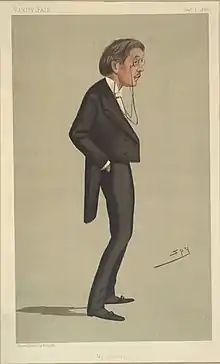William Bromley-Davenport (British Army officer)
Brigadier-General Sir William Bromley-Davenport, KCB, CMG, CBE, DSO, TD, JP, DL (21 January 1862 – 6 February 1949) was a British soldier, footballer and Conservative politician. He fought with distinction in both the Second Boer War and the First World War. An MP from 1886 to 1906, he held political office under Arthur Balfour as Financial Secretary to the War Office from 1903 to 1905.
Sir William Bromley-Davenport | |
|---|---|
 | |
| Financial Secretary to the War Office | |
| In office 12 October 1903 – 4 December 1905 | |
| Monarch | Edward VII |
| Prime Minister | Arthur Balfour |
| Preceded by | Lord Stanley |
| Succeeded by | Thomas Buchanan |
| Personal details | |
| Born | 21 January 1862 Belgravia, London |
| Died | 6 February 1949 (aged 87) Capesthorne Hall, Cheshire, England |
| Nationality | British |
| Political party | Conservative |
| Alma mater | Balliol College, Oxford |
He was a notable footballer, scoring twice for England against Wales in the 1883–84 British Home Championship, the world's first international tournament, though restricted to the Home Nations.
Background and education
Bromley-Davenport was born at 5 Lowndes Street, Belgravia, London,[1] the son of William Bromley Davenport and his wife, Augusta Elizabeth Campbell, daughter of Walter Campbell, of Islay. He was educated at Eton and Balliol College, Oxford.[2]
Footballing career
Bromley-Davenport played football for Oxford University and Old Etonians. He represented England on two occasions in March 1884, against Scotland and Wales respectively. A centre-forward, he scored two goals in the game against Wales.[3][4]
Political and military career
Bromley-Davenport was elected Member of Parliament for Macclesfield in the July 1886 general election.[5] He was appointed a captain in the Staffordshire Yeomanry on 30 December 1891, and received the honorary rank of major on 28 February 1900.[6] While an MP, he fought in the Second Boer War with the Imperial Yeomanry,[2] where he was awarded the Distinguished Service Order (DSO) in November 1900.[7] At the end of 1901, he was appointed a Deputy Lieutenant of Cheshire.[8] He served in the Conservative administration of Arthur Balfour as Financial Secretary to the War Office from 1903 to 1905 and was a Civil Member of the Army Council from 1904 to 1905.[2] However, he lost his seat in the House of Commons in the 1906 Liberal landslide.
During the First World War, Bromley-Davenport commanded the 22nd Mounted Brigade of the Egyptian Expeditionary Force with the rank of Brigadier-General from 1916[9] to 1917. He was also Assistant Director of Labour from 1917 to 1918. Between 1920 and 1949 he held the honorary post of Lord-Lieutenant of Cheshire.[2] He was made a Companion of the Order of St Michael and St George (CMG) in 1918,[10] a Commander of the Order of the British Empire (CBE) in 1919[11] and a Knight Commander of the Order of the Bath (KCB) in 1924.
Personal life
Bromley-Davenport's seat was Capesthorne Hall, Cheshire. He died there unmarried in February 1949, aged 87.[2]
References
- "Births". Cheshire Observer. 8 February 1862. p. 8. Retrieved 22 May 2023.
- "Obituary: Brig.-Gen. Sir. William Bromley-Davenport". The Times. The Times Digital Archive. 8 February 1949. p. 7.
- William Bromley-Davenport at Englandstats.com
- "England players: William Bromley-Davenport". www.englandfootballonline.com. 23 April 2019. Retrieved 25 March 2021.
- Leigh Rayment's Historical List of MPs – Constituencies beginning with "M" (part 1)
- "No. 27169". The London Gazette. 27 February 1900. p. 1355.
- "No. 27359". The London Gazette. 27 September 1901. p. 6306.
- "No. 27392". The London Gazette. 31 December 1901. p. 9176.
- "No. 29552". The London Gazette. 18 April 1916. p. 4024.
- "No. 30450". The London Gazette. 28 December 1917. p. 4.
- "No. 31370". The London Gazette. 30 May 1919. p. 6794.